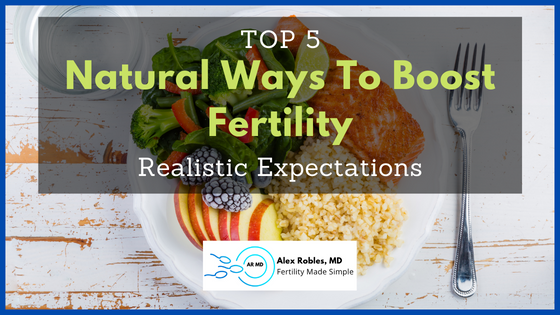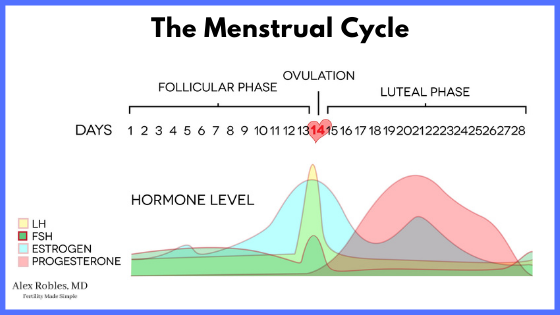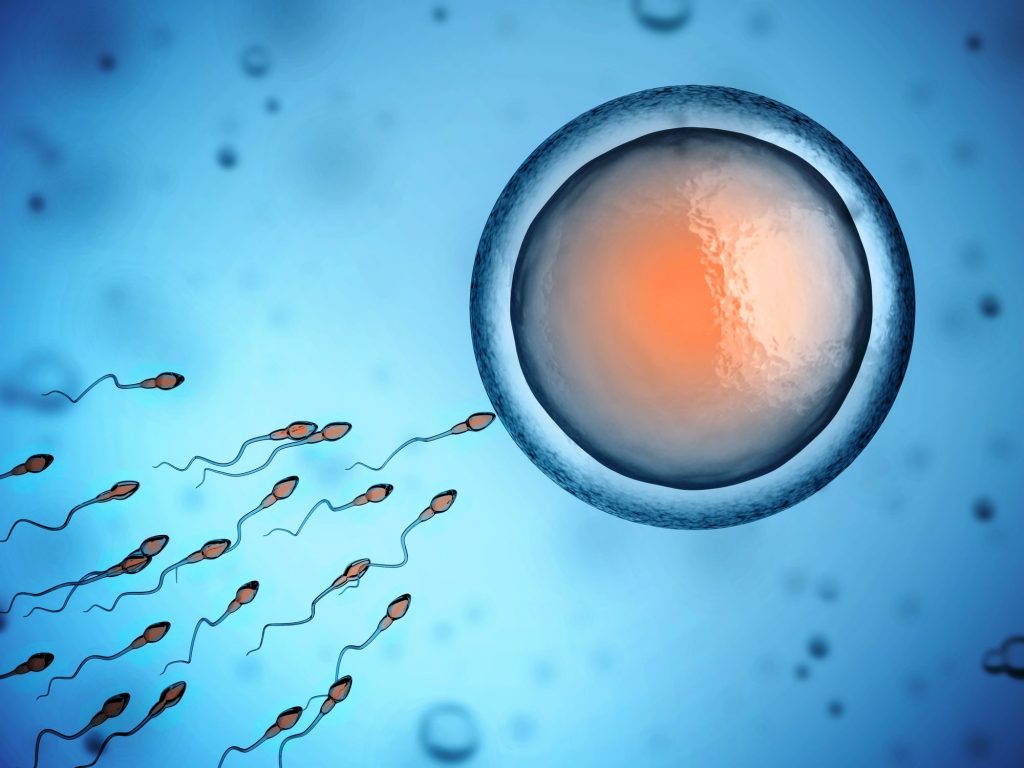One in six couples has trouble conceiving.
While many factors can affect your ability to get pregnant, there are ways to maximize your natural fertility and increase your chances of having a baby.
Keep reading to learn the top five natural ways to boost your fertility.

#1 Get to Know Your Cycle
The first step in maximizing your fertility is understanding your menstrual cycle.
If you have regular monthly periods, you will likely ovulate around day 14 of your cycle (counting from the first day you start bleeding).
Ovulation refers to the process in which your ovary releases an egg for fertilization. Knowing when you ovulate is essential because that’s when you’re most fertile.
If you have irregular periods, tracking your cycle can be more difficult, but there are still ways to do it. You can use ovulation predictor kits (OPKs) to determine when you’re about to ovulate, as they can reliably predict ovulation up to 24 hours in advance.
*Notably, basal body temperature (BBT) charting is another way to track your cycle, but it’s more complex than using OPKs. The issue with BBT is that ovulation has already occurred once your temperature starts to rise, so it’s not as helpful in predicting when to have intercourse.*
#2 Time Intercourse Before Ovulation
To maximize your chances of getting pregnant, you must have intercourse one to two days before ovulation. Once an egg is released from the ovary, it has 12-24 hours to be fertilized by sperm before it begins to break down.
However, sperm can live inside the woman’s reproductive tract for up to five days, waiting for the egg’s release.
Having intercourse a day after ovulation is unlikely to yield a pregnancy as the fertile window has passed.

#3 Maintain a Healthy Body Mass Index (BMI)
Maintaining a healthy weight is essential for fertility because it helps to optimize hormone levels and increase the chances of a successful pregnancy.
Being overweight or obese can disrupt the delicate balance of hormones needed for ovulation and fertilization. Additionally, excess body fat can lead to inflammation and insulin resistance, further interfering with fertility and staying pregnant.
In men, being overweight can lead to low testosterone levels, affecting sperm quality and production.
Modest weight loss will almost always be beneficial for overweight individuals.
On the other hand, being too underweight can also negatively impact fertility by causing a delay in ovulation or irregular menstrual cycles.
#4 Eat a Fertility-Friendly Diet
What you eat may have an impact on your fertility (in addition to your overall health). Observational studies show that eating a healthy diet of fresh fruits, vegetables, healthy fats, and plant protein may help improve your reproductive health.
Chavarro and Gaskins et al developed guidelines on the best way to follow a fertility diet which includes consumption of:
- Monounsaturated fats (like nuts and seeds)
- Plant-based or vegetable proteins sources (like beans, lentils, etc)
- Seafood (over other animal proteins)
- Low glycemic carbohydrates (I.e., don’t raise your blood sugar such as fruits and vegetables)
- Full-fat dairy products (like yogurt and cheese)
- Whole grains
- Iron from plants
On the other hand, they recommend minimizing the consumption of trans fats, highly-processed foods, and excessive alcohol, which may negatively affect fertility.
It is unclear if caffeine intake has a negative impact on fertility.
In addition, now is an excellent time to take a prenatal vitamin with Folate, Vitamin D, Vitamin B Complex, Calcium, Iron, Zinc, and Magnesium in anticipation of pregnancy.
#5 Manage Stress Levels
While many people know that stress can impact overall health, few realize that it may cause fertility issues.
Data shows that high stress levels correlate with an increased time to conception. Conversely, some data indicate that stress-lowering interventions may help improve fertility.
Stress doesn’t just come from life events. It can also result from excessive exercise, a lack of sleep, and too much alcohol consumption.
When the body is under stress, it releases a hormone known as cortisol. In small amounts, cortisol can be beneficial, providing the body with a boost of energy.
However, when cortisol levels are constantly high, it can interfere with the reproductive hormones needed for ovulation.
Some of the best ways to manage stress include:
- Yoga,
- Moderate exercise,
- Meditation,
- Deep breathing exercises,
- Acupuncture,
- Cognitive behavioral therapy
Keep Your Biological Clock In Mind
The biological clock is a term used to refer to the gradual decline in a woman’s fertility that begins in her early 30s.
Unfortunately, many women will have more difficulty conceiving after the age of 35-37. The biological clock occurs due to a decrease in both the quantity and quality of eggs.
As a result, older women are at an increased risk of creating embryos with genetic abnormalities, resulting in miscarriages or pregnancy losses.
By understanding the biology of fertility, women can make informed choices about when to start a family. Several treatments available can help women conceive later in life, but these are more likely to be successful if they are started before age 40.
What Treatment Options Are Available For Women Who Have Difficulty Conceiving?
There are many treatment options available for couples who have difficulty conceiving. Sometimes, lifestyle changes, such as losing weight or quitting smoking, can help improve fertility.
However, if lifestyle changes are insufficient, various fertility treatments are available.
Treatments include medications to stimulate ovulation, intrauterine insemination (IUI), and in vitro fertilization (IVF).
In IUI, sperm is placed into the woman’s uterus around the time of ovulation. Doing so can help to increase the chances of fertilization by placing the sperm closer to the egg.

IVF is a more advanced fertility treatment in which eggs are removed from the woman’s ovaries and fertilized with sperm in a laboratory. The resulting embryos are then transferred into the woman’s uterus. IVF is often the last resort when other fertility treatments have failed.
Each of these treatments has risks and benefits, and discussing all options with a fertility specialist before deciding on a course of action is essential.
In some cases, a combination of treatments is necessary to achieve a successful pregnancy.
With modern advances in fertility treatments, more and more women can conceive and have healthy babies.
Are There Any Supplements To Boost Fertility?
While there are no guaranteed fertility-boosting supplements, some research suggests that certain nutrients may improve fertility health.
For example, Coenzyme Q10 may improve egg quality and increase clinical pregnancy rates in women undergoing fertility treatments.
Supplementing omega-3 fatty acids may also improve fertility to a small degree, while antioxidants like vitamin E may protect eggs and sperm from oxidative damage.
Unfortunately, the data on fertility-enhancing supplements is limited, and more research is needed in this area before we can make definitive recommendations.
Always speak with your healthcare provider before taking any medications or supplements.
Final Words On Maximizing Your Chances Of Conceiving
Maximizing your natural fertility involves understanding the biology of reproduction and trying to make healthy lifestyle choices.
Making healthy food choices, maintaining healthy body weight, managing stress, and avoiding harmful substances may help improve your chances of conception.
These interventions will also provide you with numerous other health benefits.
However, if you still have difficulty conceiving, be sure to speak with a reproductive endocrinologist/ infertility specialist to discuss your fertility treatment options.
Next up:
- When Should You See A Reproductive Endocrine / Infertility Specialist (15 Reasons)
- IUI vs IVF: How To Decide Which Option Might Be Right For You
- The Biological Clock In Women (The Truth You Need To Know)
Make An Appointment With Dr. Robles To Discuss Your Fertility Options Today!

Alex Robles, MD
Dr. Alex Robles is a Spanish-speaking Latino-American Reproductive Endocrinologist and Infertility specialist in New York City, and a board-certified OBGYN. He has a special interest in health, lifestyle, & nutrition. Make an appointment with Dr. Robles to discuss your fertility options today!
